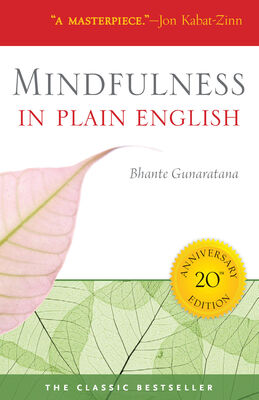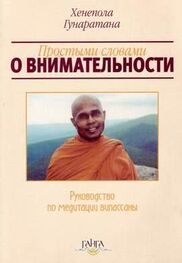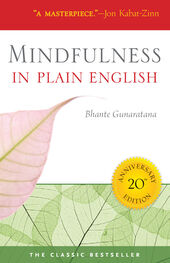3. Don’t rush: There is no hurry, so take you time. Settle yourself on a cushion and sit as though you have a whole day. Anything really valuable takes time to develop. Patience, patience, patience.
4. Don’t cling to anything and don’t reject anything: Let come what comes and accommodate yourself to that, whatever it is. If good mental images arise, that is fine. If bad mental images arise, that is fine, too. Look on all of it as equal and make yourself comfortable with whatever happens. Don’t fight with what you experience, just observe it all mindfully.
5. Let go: Learn to flow with all the changes that come up. Loosen up and relax.
6. Accept everything that arises: Accept your feelings, even the ones you wish you did not have. Accept your experiences, even the ones you hate. Don’t condemn yourself for having human flaws and failings. Learn to see all the phenomena in the mind as being perfectly natural and understandable. Try to exercise a disinterested acceptance at all times and with respect to everything you experience.
7. Be gentle with yourself: Be kind to yourself. You may not be perfect, but you are all you’ve got to work with. The process of becoming who you will be begins first with the total acceptance of who you are.
8. Investigate yourself: Question everything. Take nothing for granted. Don’t believe anything because it sounds wise and pious and some holy men said it. See for yourself. That does not mean that you should be cynical, impudent or irreverent. It means you should be empirical. Subject all statements to the actual test of your experience and let the results be your guide to truth. Insight meditation evolves out of an inner longing to wake up to what is real and to gain liberating insight to the true structure of existence. The entire practice hinges upon this desire to be awake to the truth. Without it, the practice is superficial.
9. View all problems as challenges: Look upon negatives that arise as opportunities to learn and to grow. Don’t run from them, condemn yourself or bear your burden in saintly silence. You have a problem? Great. More grist for the mill. Rejoice, dive in and investigate.
10. Don’t ponder: You don’t need to figure everything out. Discursive thinking won’t free you from the trap. In mediation, the mind is purified naturally by mindfulness, by wordless bare attention. Habitual deliberation is not necessary to eliminate those things that are keeping you in bondage. All that is necessary is a clear, non-conceptual perception of what they are and how they work. That alone is sufficient to dissolve them. Concepts and reasoning just get in the way. Don’t think. See.
11. Don’t dwell upon contrasts: Differences do exist between people, but dwelling upon then is a dangerous process. Unless carefully handled, it leads directly to egotism. Ordinary human thinking is full of greed, jealousy and pride. A man seeing another man on the street may immediately think, “He is better looking than I am.” The instant result is envy or shame. A girl seeing another girl may think, “I am prettier than she is.” The instant result is pride. This sort of comparison is a mental habit, and it leads directly to ill feeling of one sort or another: greed, envy, pride, jealousy, hatred. It is an unskillful mental state, but we do it all the time. We compare our looks with others, our success, our accomplishments, our wealth, possessions, or I.Q. and all these lead to the same place—estrangement, barriers between people, and ill feeling.
The meditator’s job is to cancel this unskillful habit by examining it thoroughly, and then replacing it with another. Rather than noticing the differences between self and others, the meditator trains himself to notice similarities. He centers his attention on those factors that are universal to all life, things that will move him closer to others. Thus his comparison, if any, leads to feelings of kinship rather than feelings of estrangement.
Breathing is a universal process. All vertebrates breathe in essentially the same manner. All living things exchange gasses with their environment in some way or other. This is one of the reasons that breathing is chosen as the focus of meditation. The meditator is advised to explore the process of his own breathing as a vehicle for realizing his own inherent connectedness with the rest of life. This does not mean that we shut our eyes to all the differences around us. Differences exist. It means simply that we de-emphasize contrasts and emphasize the universal factors. The recommended procedure is as follows:
When the meditator perceives any sensory object, he is not to dwell upon it in the ordinary egotistical way. He should rather examine the very process of perception itself. He should watch the feelings that arise and the mental activities that follow. He should note the changes that occur in his own consciousness as a result. In watching all these phenomena, the meditator must be aware of the universality of what he is seeing. That initial perception will spark pleasant, unpleasant or neutral feelings. That is a universal phenomenon. It occurs in the mind of others just as it does in his, and he should see that clearly. Following these feelings various reactions may arise. He may feel greed, lust, or jealousy. He may feel fear, worry, restlessness or boredom. These reactions are universal. He simply notes them and then generalizes. He should realize that these reactions are normal human responses and can arise in anybody.
The practice of this style of comparison may feel forced and artificial at first, but it is no less natural than what we ordinarily do. It is merely unfamiliar. With practice, this habit pattern replaces our normal habit of egoistic comparing and feels far more natural in the long run. We become very understanding people as a result. We no longer get upset by the failings of others. We progress toward harmony with all life.
Although there are many subjects of meditation, we strongly recommend you start with focusing your total undivided attention on your breathing to gain some degree of shallow concentration. Remember that you are not practicing a deep absorption or pure concentration technique. You are practicing mindfulness for which you need only a certain degree of shallow concentration. You want to cultivate mindfulness culminating in insight and wisdom to realize the truth as it is. You want to know the working of your body-mind complex exactly as it is. You want to get rid of all psychological annoyance to make your life really peaceful and happy.
The mind cannot be purified without seeing things as they really are. “Seeing things as they really are” is such a heavily loaded and ambiguous phrase. Many beginning meditators wonder what we mean, for anyone who has clear eye sight can see objects as they are.
When we use this phrase in reference to insight gained from our meditation, what we mean is not seeing things superficially with our regular eyes, but seeing things with wisdom as they are in themselves. Seeing with wisdom means seeing things within the framework of our body/mind complex without prejudices or biases springing from our greed, hatred and delusion. Ordinarily when we watch the working of our mind/body complex, we tend to hide or ignore things which are not pleasant to us and to hold onto things which are pleasant. This is because our minds are generally influenced by our desires, resentment and delusion. Our ego, self or opinions get in our way and color our judgment.
When we mindfully watch our bodily sensations, we should not confuse them with mental formations, for bodily sensations can arise without anything to do with the mind. For instance, we sit comfortably. After a while, there can arise some uncomfortable feeling on our back or in our legs. Our mind immediately experiences that discomfort and forms numerous thoughts around the feeling. At that point, without trying to confuse the feeling with the mental formations, we should isolate the feeling as feeling and watch it mindfully. Feeling is one of the seven universal mental factors. The other six are contact, perception, mental formations, concentration, life force, and awareness.
Читать дальше





